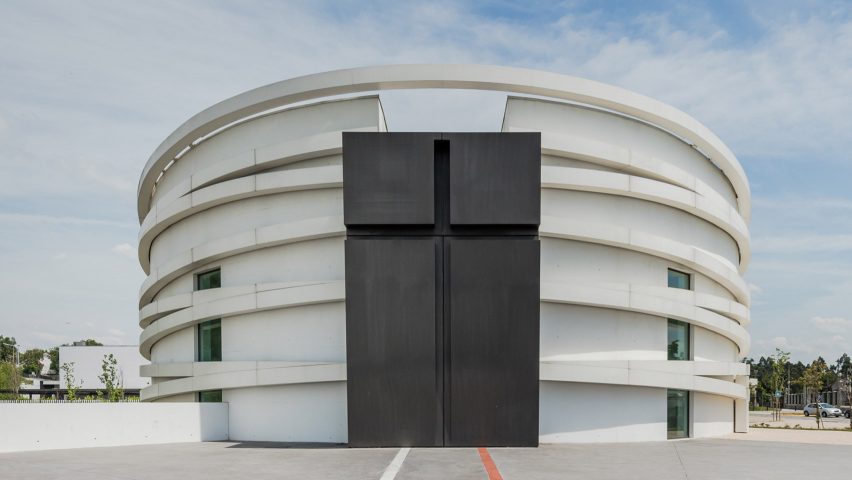This oval-shaped church in the Portuguese town of Vila Nova de Famalicão is surrounded by rings referencing the crown of thorns placed on Jesus' head.
Architect Hugo Correia designed the Church of San Tiago de Antas for a site overlooking the town and the wooded countryside of the Braga district in northern Portugal.
According to the architect the church is carefully integrated into the surrounding environment, which includes a historically significant Romanesque church, a mortuary chapel and a cemetery.
The architect also considered the area's history and the local community's relationship with its faith when developing the design. The result is a relatively simple volume with a low-key expression intended to minimise its impact on the setting.
The two-storey building accommodates the main hall used by the congregation on the ground floor, with additional facilities for cultural and educational use housed in a basement level.
The curving concrete structure is embellished with details that subtly hint at its religious programme. The most notable of these are the interlocking bands that wrap around the exterior to give the surfaces a distinctive relief.
"The project incorporates a vast symbolic significance, since several liturgical elements are present in order to create a narrative," Correia explained.
"The elliptical form of the church emerges from the chalice and cross of passion, and the rings surrounding the temple symbolise the crown of thorns, an instrument of torture used by the Romans during the crucifixion of Jesus."
A huge steel door at the main entrance is formed from four segments that create the shape of a cross in the voids between them.
The lower two panels pivot to create a large opening with a view towards a backlit cross behind the altar.
The wooden floor of the nave also incorporates a pair of red and white lines picked out in marble that extend from either side of the altar towards the main entrance and out onto the landscaped grounds.
"One of the lines represents the Jordan River, the place of Christ's baptisms, connecting the exterior of the church to the baptismal font and then to the main altarpiece," the architect added.
"The other represents the blood coming from the sword of St. James, and connects from the outside to the pulpit where the readings of the sacred texts are made."
The interior of the nave follows the curving form of the exterior and features bare white walls with very few openings that contribute to a serene and austere environment.
Illumination is provided by concealed skylights which allow natural light to wash across the walls and ceiling, resulting in a diffused light that contributes to the tranquil mood.
The altar is flanked by a pair of panels decorated with images of St. James and Our Lady of Conception, which are made from a ceramic mosaic with highlight in gold and silver leaf.
These panels are the only instances of ornamentation throughout the pared-back interior, which also features minimal wooden pews and furniture designed by the project team.
Earlier this year Álvaro Siza completed a white-concrete church in Brittany, while Brno-based studio Atelier Štěpán created a cylindrical church in the Czech Republic in 2017.
Photography is by João Morgado.

